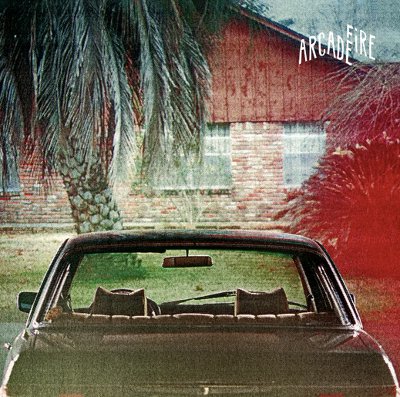
Rating: 4.5 out of 5
Arcade Fire’s 2010 album, The Suburbs, is a truly delightful piece of musical drama. It takes the band in a refreshing direction by leaving out the orchestration that was evident in Neon Bible. While Neon Bible had a power to it, the newest album steers in a more melancholic direction, although the subject matter remains a little dark and somber.
The band has pinned themselves with good comparisons by citing Neil Young and Depeche Mode as inspirations. Win Butler’s voice has always had a similar Canadian tinge as Neil Young, and it shows now more than ever. He channels Young and brings Crazy Horse into the revisited 80s era. He also throws in more falsetto, a trend that is rising with the likes of Bon Iver, Active Child, and even The Black Keys hitting some higher notes in “Everlasting Light.” In other ways the homesick country-folk suburbs feel of the album pulls them closer to early Wilco territory. Overall, The Suburbs is highly enjoyable. All sixteen tracks have some admirable merits. My personal favorites are the opening and closing songs. Somewhere in the middle, I think the songs get slightly weaker, but that is only based on my personal preferences.
Track-by-track review:
1. The Suburbs
I feel the nostalgia of his Win’s childhood, and the refabrication of modernism. The 70s atmosphere in his 80s and 90s experience.
2. Ready to Start
Art school, modern times, “then I guess I’ll just begin again.” Starting over in the contemporary world. We can face the fear of the change of life and music.
3. Modern Man
Being modern is being past. “Maybe when you’re older you will understand,” that it’s history that unfolding and new and old become relative. How new is a record player skipping? It’s back to the heyday of records (think 70s and pre-cassette tape). Arcade Fire is playing with time and culture. Modern man is not all that there is. We have postmodern men now, and distinctions aren’t clear.
4. Rococo
One has to wonder what the band was thinking with the song “Rococo.” Although “Rococo” refers to a period of art history, I couldn’t help but imagine the band was chanting “I’m with COCO.” Maybe, Conan O’Brian should adopt the song as his battle cry.
Yet we are talking to modern kids– the young emerging from the old. Again, turning to art, and confusion in lyrical content. Throwing out the terms of yester-century of lavish living.
5. Empty Room
Regine seems to carry a new wave vibe going with energetic tones. Sounds like a forgotten Ramone’s tune that was too high pitched for Bruce Springsteen to record.
6. City With No Children
History advances, and advances are historical. Win Butler feels discontinued family life in his old stomping grounds. There are no heirs to society We are only echoing the past. The melody of the last line echoes “Heroes and Villains” by The Beach Boys. Although the song is completely different, can you hear the similar ending of the stanza? Hear the extended mix below.
The lyrics even recall an experience of Butler’s.
I’ve been in this town so long that back in the city
I’ve been taken for lost and gone
And unknown for a long long time
7. Half Light I
A different perspective on a place can recreate a new place for you. You can only trace your old environment. Best lines:
Our heads are just houses
Without enough windows
They say you hear human voices
But they only echo
8. Half Light II (No Celebration)
A subtle pulsating new wave beat strikes. The wheels of a car are in Texas, not in a land of cowboys, but where Neil Young and Depeche Mode cross paths. A fantasy.
9. Suburban War
And the wheels move. The exposure to sad British pop music is evident in his voice here. He comments on genre and how music divides us into tribes.
10. Month of May
The prolonged 8th-note power cord verges on The Replacements covering The Ramones covering Link Ray. The lyrics are more chant-like than reflective, especially with the year-drop (2009-2010)
11. Wasted Hours
Neil Young is revived. And time is slipping away…
12. Deep Blue
100 years have passed, and tomorrow is meaningless. The human hands hit piano keys and voice brings a la-le-la. An electronic computer noise whizzes. Machine versus Man. This is about world class Garry Kasparov battling IBM’s Deep Blue supercomputer at a chess game. Winning in 1996, then losing in 1997.
While nobody owns the phrase about a century ending, I drag in the Ramone’s “End of the Century” and Wilco‘s “I Got You (At the End of the Century)” who both reference “the 70s” as Arcade Fire does in the first track.
13. We Used to Wait
A song about desire and patience. They demand that you sing the chorus again. And they get you into it.
14. Sprawl I (Flatland)
A dramatic ballad of revisiting an old home, driving into your past, and witnessing the alteration of previous surroundings.
15. Sprawl II (Mountains Beyond Mountains)
You either love her voice or you want the old male to sing. But I’m pretty flexible and happen to really enjoy this one. The most dance-ready track that should’ve hit the 80s. Not typical Arcade Fire, but catchy and fresh. It’s an antsy road trip with a group ready to escape the rising “dead shopping malls.”
16. The Suburbs (continued)
Reprises are good. A little repetition never hurt anyone unless you are stuck in repeat.






